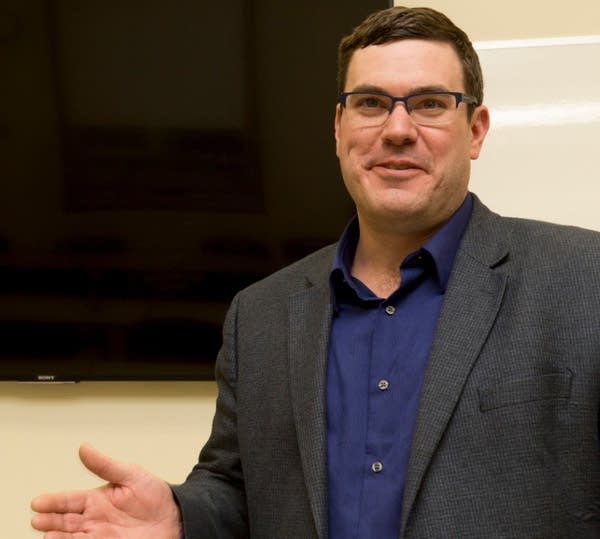Trial begins for Hopkins man charged in overdose deaths of 11
Go Deeper.
Create an account or log in to save stories.
Like this?
Thanks for liking this story! We have added it to a list of your favorite stories.
Testimony began Monday in the trial of a Hopkins man who’s charged in the fentanyl overdose deaths of 11 people. Federal prosecutors say Aaron Broussard, 31, bought drugs from China and sold them through the mail to buyers across the United States. Among his alleged victims was a University of Minnesota economist.
In her opening statement this morning, Assistant U.S. Attorney Melinda Williams said Broussard ran a black market business out of his apartment in Hopkins. He bought the substances from “sketchy labs in China” and resold them at a 10-fold markup through his website plantfoodusa.net.
In March of 2016, Broussard allegedly purchased 100 grams of a drug called 4-fluoroamphetamine, or 4-FA for short. It’s a stimulant that investigators say is similar to amphetamine or ecstasy.
What Broussard allegedly received from TopKeyChem, a supplier in China, was not 4-FA, it was 100 grams of pure fentanyl. Nevertheless, prosecutors say when his alleged customers ordered 4-FA, he packaged up the fentanyl in polyester film pouches and dropped them in the mail along with handwritten notes that said PFUSA.
Turn Up Your Support
MPR News helps you turn down the noise and build shared understanding. Turn up your support for this public resource and keep trusted journalism accessible to all.
Jurors heard testimony from David Masik, the father of Devon Masik. Originally from Racine, Wisconsin, the 25-year-old died in Orange County, California after ingesting fentanyl thinking it was 4-FA. Masik testified that his daughter did not suffer from an opioid addiction. Prosecutors showed a photo from her apartment; next to Masik’s body was a handwritten note that said PFUSA.
Amy Robertson of Paint Lick, Ky., told the jury a similar story about her husband, 32-year-old Timothy Robertson. Robertson told jurors that she was surprised when her mother-in-law called her at work to let her know that Timothy was unresponsive. He spent five days in a Lexington hospital before doctors removed his breathing tube.
Only one of Broussard’s alleged victims was from Minnesota, Jason Beddow, 41, an agricultural economist at the University of Minnesota.

His wife Lucy Angelis said on the witness stand that she became extremely worried when he didn’t come home on time, and didn’t respond to multiple calls or text messages. The medical examiner’s office initially told her that her husband had died of a heart attack. Several months later a toxicology report confirmed the cause was a fentanyl overdose.
In an interview with MPR News following her testimony, Angelis said that her husband never used opioids, and was always careful, even with prescription drugs.

“Afterwards I found out that he was looking for something that helped his brain function better. Because he was a smart guy and he knew that there was stuff he hadn’t tapped into, and he was just trying to grasp at it.”
According to court documents, federal investigators first started looking at Broussard more than a year before his 11 alleged customers died of overdoses. In late 2014 and early 2015, customs officials in San Francisco intercepted four packages that were addressed to Broussard’s grandmother’s home in Lafayette, La., but investigators did not succeed in their attempts to deliver them.
Then in the spring of 2016, authorities connected the deaths of two people — including Beddow — to fentanyl purchased through plantfoodusa.net. Later that year, a grand jury in Pennsylvania indicted Broussard in connection with Beddow’s death and the fatal overdose of Amanda Leach of Scranton.
Investigators would eventually determine that nine other people across the country died after ingesting fentanyl that they believed was 4-FA. Prosecutors moved the case to Minnesota in 2019, where a grand jury returned an expanded indictment.
Broussard is also charged in the overdoses of six other people who survived but suffered serious injuries.
While he was under indictment, Broussard was representing himself and filing his own legal motions from jail. After Judge Susan Richard Nelson seated the jury last week, Broussard decided to have Twin Cities defense attorney Aaron Morrison represent him. The court had designated Morrison as standby counsel.
During his brief opening statement, Morrison said Broussard never intended to distribute fentanyl, and said 4-FA and other so-called analog drugs are not on the government’s list of controlled substances.
Morrison also said prosecutors must prove that it was fentanyl and not a combination of factors that caused each of the deaths.



